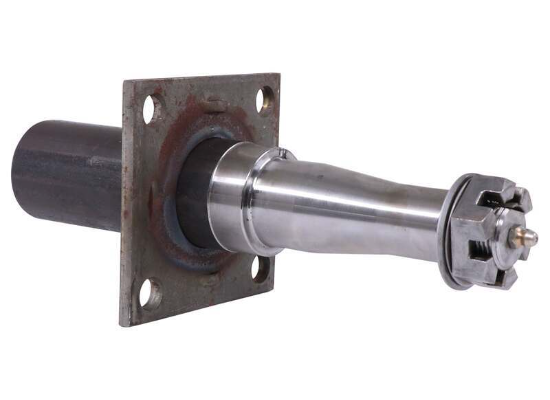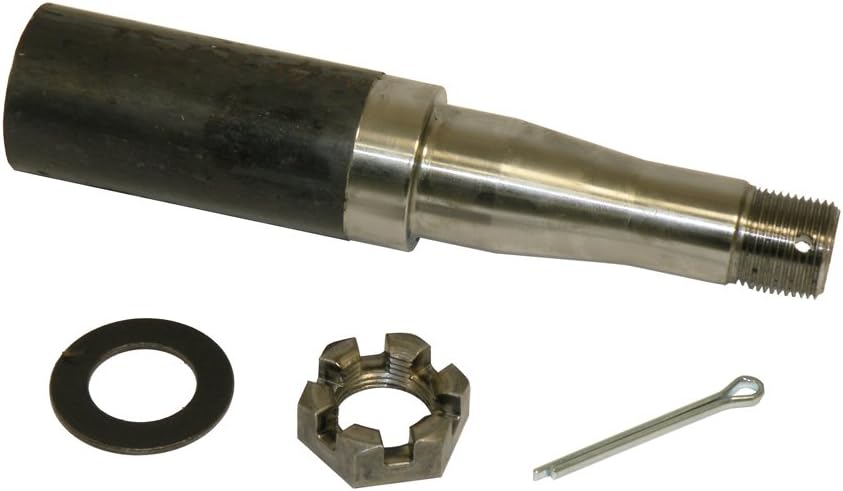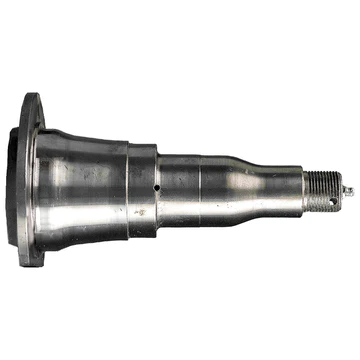Product Description
1
Products
Name: semi-trailer drop forging spare parts forged alloy steel trailer axle spindle
Material: 40CrMo
Weight: From .2kg-20kg
Packing: wooden case
Min order: 1000pcsdry van trailerdrop forging spare parts forged alloy steel trailer spindle
Customized production is available as your drawings or sample.
| Process | Die Forging | |
| Material | Stainless Steel, Carbon Steel, Alloy Steel | |
| Weight | 2Kg~20Kg | |
| Heat Treatment | Quenching, Annealing,Tempering,Normalizing, Quenching and Tempering | |
| Testing instrument | composition testing | Spectrometer, Metallographic microscope |
| Performance testing | Hardness tester, Tensile testing machine | |
| Size Measuring | CMM,Micrometer, Vernier Caliper, Depth Caliper, feeler gauge | |
| Thread Gauge , Height Gauge | ||
| Roughness | Ra1.6~Ra6.3 | |
| Machining Equipment | CNC Center , CNC Machines, Turning, Drilling, Milling, boring machine,Grinding Machines, | |
| Wire EDM,Laser Cutting&Welding, Plasma Cutting &Welding, EDM etc. | ||
| Quality control | Sampling inspection of raw materials and semi-finished products, 100% Inspection of finished products | |
| Surface Treatment | Shot Blast , Powder Coating, Polishing, Galvanized , Chrome Plated | |
| Production Capacity | 60000T / Years | |
| Lead Time | Normally 30 – 45 Days. | |
| Payment Terms | T/T , L/C | |
| Material Standard | ASTM , AISI , DIN , BS, JIS, GB, | |
| Certification | ISO9001:2008, IATF16949:2016 | |
2
Products Quality Control
Quality control involve the inspection and control of incoming materials, production processes, and finished products.
The quality control process includes,
1 First of all, the incoming raw materials with random sampling are analyzed by metallographic microscope to ensure that the chemical composition meets the production requirements
2 Then In the production process, there are QC staffs timely sampling ensure that the products are free of defects in the manufacturing process, and to coordinate and handle any abnormal quality issues may be occurred.
3 The final step of production process is magnetic particle flaw detector of the metal parts to detect it’s hidden crack or other defects.
4 All the finished metal parts is sampled in proportion and sent to the laboratory for various mechanical performance tests and size measurement, and the surface quality is manually 100% inspected.
The relevant testing equipment pictures are as following:
3
Quality Management System Control:
We strictly carry out system management accordance with iso9001 and ts16949 quality standards. And 5S lean production management is implemented on the production site.
The production management site as following:
4
Our Advantages:
Brand
Our parent company, HiHangZhou Group, is a world-renowned high-end machinery manufacturing enterprise with 40 domestic subsidiaries and branches and 8 foreign manufacturing plants. Has long-term experience and good reputation in cooperation with world-renowned enterprises.
Technology
We have a complete production process and equipment research and development capabilities for ferrous metals forming. More than 25 years of production experience in forging equipment and casting equipment manufacturers, make us more thoroughly get all the performance of each equipment. One-third of our company’s employees are technician and R&D personnel, ensuring that high-quality products are produced with high efficiency.
Service
We can provide custom and standard manufacturing services with multiple manufacturing process integrations. The quality and delivery of products can be fully guaranteed, and the ability to communicate quickly and effectively.
Culture
The unique corporate culture can give full play to the potential of individuals and provide a strong vitality for the sustainable development of the company.
Social responsibility
Our company strictly implements low-carbon environmental protection, energy-saving and emission-reduction production, and is a benchmark enterprise in local region.
Certificates
5
Company Culture
Our Vision
To become 1 of the leading companies
Our Mission
To become a platform for employees to realize their dream
To become 1 of the transforming and upgrading pacemaker of Chinese enterprises
To set the national brands with pride
Our Belief
Strive to build the company into an ideal platform for entrepreneurs to realize their self-worth and contribute to the society
Values
Improvement is innovation, everyone can innovate
innovation inspired and failures tolerated
6
FAQ
1.
Q: Are you a trading company or a manufacturer?
A: Obviously we are a manufacturer of forging products, casting products and also have a high level of machining capabilities.
2.
Q: What series products do your have?
A: We are mainly engaged in forming processing of ferrous metals, including processing by casting , forging and machining. As you know, such machinery parts can be observed in various industries of equipment manufacturing.
3
Q: Do you provide samples? is it free?
A: Yes, we commonly provide samples according to the traditional practice, but we also need customers to provide a freight pay-by-account number to show mutual CHINAMFG of cooperation.
4
Q: Is OEM available?
A: Yes, OEM is available.
5
Q: What’s your quality guarantee?
A: We insist that the survival of the company should depend on the products quality continuous improvement, without which we cannot survive for long. We carry out strictly product quality control for every process from incoming materials, production process to finished products via advanced detection instrument and equipment. We also invite independent third parties to certify our quality and management systems. Till now we have passed ISO/TS16949 and SGS certification .
6
Q. How about the Packing?
A: We usually use the iron box, or wooden case, also it can be customized according to customer’s demands.
7
Q: What is your minimum order quantity?
A: Yes, we require all international orders to have an minimum order quantity. The quantity is up to the exact products feature or property such as the material, weight, construction etc.
8
Q: What is the lead time?
A: Generally our forging products and casting products need to make new dies or molds, the time of making new dies or molds and samples within 30-45 days, and the large batch production time within 30-45 days. it’s also according to the parts structural complexity and quantity.
9
Q: What kinds of payment methods do you accept?
A: You can make the payment by T/T or L/C. 30% deposit in advance, 70% balance against the copy of B/L.
/* January 22, 2571 19:08:37 */!function(){function s(e,r){var a,o={};try{e&&e.split(“,”).forEach(function(e,t){e&&(a=e.match(/(.*?):(.*)$/))&&1
| Processing Object: | Metal |
|---|---|
| Molding Style: | Forging |
| Molding Technics: | Pressure Casting |
| Application: | Auto Parts |
| Material: | Steel |
| Heat Treatment: | Tempering |
| Samples: |
US$ 20/Piece
1 Piece(Min.Order) | |
|---|
| Customization: |
Available
|
|
|---|

Can you explain the role of bearings in conjunction with trailer spindles in towing systems?
Trailer bearings play a critical role in conjunction with trailer spindles in towing systems. Here’s an explanation of their role:
Trailer bearings are components that facilitate the smooth rotation of the trailer wheels around the spindles. They are located within the hub assembly and provide a low-friction interface between the stationary spindle and the rotating wheel. The bearings allow the trailer wheels to rotate freely while supporting the weight of the trailer and its cargo.
The primary functions of bearings in conjunction with trailer spindles are:
- Load Support: Bearings bear the weight of the trailer and its cargo, transferring the load from the axle to the wheels. They distribute the load evenly across the spindle, preventing excessive stress on any specific area and ensuring optimal load capacity.
- Reducing Friction: Bearings minimize friction between the stationary spindle and the rotating wheel hub. By providing a smooth, low-friction interface, they allow the wheels to rotate freely with minimal resistance. This reduces energy consumption and promotes efficient towing.
- Alignment and Stability: Bearings help maintain proper alignment and stability of the trailer wheels. They ensure that the wheels rotate in a straight line and prevent wobbling or uneven tire wear. This is crucial for safe and controlled towing, as improper wheel alignment can lead to handling issues and compromised stability.
- Shock Absorption: Bearings also play a role in absorbing shocks and vibrations encountered during towing. They provide a cushioning effect, reducing the impact of bumps and irregularities on the trailer wheels. This helps improve overall ride comfort and protects the trailer and its contents from excessive jolts or vibrations.
- Lubrication: Properly lubricated bearings reduce friction and heat generation. They also help prevent premature wear and damage to the bearing surfaces. Lubrication ensures smooth operation and extends the lifespan of the bearings and the overall functionality of the towing system.
It’s important to note that trailer bearings require regular maintenance, including inspection, cleaning, and lubrication, to ensure their optimal performance and longevity. Neglecting bearing maintenance can lead to overheating, premature wear, and ultimately, bearing failure, which can result in costly repairs and unsafe towing conditions.
When selecting bearings for trailer spindles, it’s crucial to choose high-quality bearings that are appropriate for the load capacity and towing conditions. It’s recommended to follow the manufacturer’s guidelines regarding bearing specifications, lubrication intervals, and maintenance procedures to ensure proper functioning of the bearings in conjunction with the trailer spindles.
In summary, trailer bearings are essential components in towing systems that work in conjunction with trailer spindles. They support the load, reduce friction, maintain alignment and stability, absorb shocks, and require regular maintenance to ensure optimal functionality and safe towing operations.

Can trailer spindles be customized for specific trailer types or load capacities?
Yes, trailer spindles can be customized to meet the specific requirements of different trailer types or load capacities. Here’s a detailed explanation:
Trailer spindles are available in various sizes, configurations, and materials to accommodate different trailer types and load capacities. Manufacturers offer a range of spindle options designed to meet specific application needs.
- Trailer Types:
Trailer spindles can be customized to suit different trailer types such as utility trailers, boat trailers, RV trailers, horse trailers, and more. Each trailer type may have unique requirements in terms of load capacity, axle configuration, wheel size, and operating conditions. Customized spindles are designed to fit the specific dimensions and specifications of the trailer type.
- Load Capacities:
Trailer spindles can be customized to handle varying load capacities. The load capacity of a trailer is determined by factors such as the trailer’s construction, axle rating, suspension system, and intended use. Customized spindles can be engineered to accommodate the specific load capacity requirements, ensuring that they are robust enough to handle the expected weight without compromising safety or performance.
- Materials and Construction:
Trailer spindles can be customized based on the materials used and their construction. Different materials, such as steel or aluminum, may be chosen depending on factors such as strength, weight, and corrosion resistance. Customized spindles can be manufactured using specific materials and construction techniques to meet the desired performance characteristics and environmental considerations.
- Braking Systems:
Customized trailer spindles can be designed to accommodate specific braking systems. Some trailers may require spindles with integrated brake provisions or compatibility with specific brake assemblies, such as hydraulic or electric brakes. Customization ensures that the spindles are properly configured to work in conjunction with the trailer’s braking system, enhancing safety and control during towing.
- Manufacturer Recommendations:
When customizing trailer spindles, it is important to consider the manufacturer’s recommendations or specifications. The trailer manufacturer can provide guidance on the suitable spindle options based on the trailer model, intended use, and performance requirements. Following the manufacturer’s recommendations ensures compatibility and adherence to warranty and safety standards.
It’s worth noting that while customization options are available, it is essential to work with reputable manufacturers or suppliers with expertise in trailer components. They can provide guidance, technical support, and ensure that the customized spindles meet the necessary quality and safety standards.
In summary, trailer spindles can be customized to match specific trailer types or load capacities. Customization allows for the selection of spindles that are tailored to the trailer’s requirements in terms of load capacity, materials, construction, and braking systems. By considering manufacturer recommendations and working with trusted suppliers, customized spindles can be obtained to ensure optimal performance, safety, and compatibility with the trailer.

What are the different types and sizes of trailer spindles available in the market?
Trailer spindles come in various types and sizes to accommodate different trailer configurations and towing requirements. Here’s a detailed explanation of the different types and sizes of trailer spindles available in the market:
- Straight Spindle:
The straight spindle is the most common type of trailer spindle. It features a straight design without any taper. These spindles are typically used in trailers that require a simple and straightforward wheel attachment.
- Tapered Spindle:
Tapered spindles have a tapered shape, with the diameter gradually decreasing from the base towards the end. The taper allows for a secure and tight fit when the spindle is inserted into the wheel hub assembly. Tapered spindles are widely used in trailers and provide enhanced stability by minimizing the potential for wheel detachment.
- Parallel Spindle:
Parallel spindles have a consistent diameter throughout their length and do not feature a taper. These spindles offer simplicity and ease of installation, making them suitable for certain trailer applications where a tapered design is not required.
- Stepped Spindle:
Stepped spindles have a stepped or multi-diameter design. They feature different diameter sections along their length, allowing for compatibility with wheels of varying sizes. Stepped spindles are often used in trailers that need to accommodate different wheel sizes or in situations where wheel upgrades are common.
- Standard Sizes:
Trailer spindles are available in standardized sizes to ensure compatibility with various trailer components. The most common spindle sizes include 1-inch, 1-1/16-inch, 1-3/8-inch, and 1-3/4-inch diameters. These sizes are commonly used in light to medium-duty trailers.
- Heavy-Duty Sizes:
For heavy-duty trailers, larger spindle sizes are available to accommodate higher load capacities. These sizes can range from 2 inches to 3-1/2 inches in diameter, depending on the specific requirements of the trailer.
- Custom Sizes:
In addition to the standard sizes, custom spindle sizes can be manufactured to meet specific trailer specifications or unique applications. These custom spindles are designed and produced based on the specific requirements provided by the trailer manufacturer or the customer.
It’s worth noting that the availability of different types and sizes of trailer spindles may vary depending on the region and specific manufacturers. It is essential to consult with trailer manufacturers, suppliers, or industry professionals to determine the appropriate spindle type and size for a particular trailer application.
In summary, the market offers various types and sizes of trailer spindles, including straight, tapered, parallel, and stepped spindles. Standard sizes range from 1 inch to 1-3/4 inches, while heavy-duty sizes can be larger, from 2 inches to 3-1/2 inches in diameter. Custom spindle sizes are also available to meet specific trailer requirements. Selecting the appropriate spindle type and size is crucial to ensure proper wheel attachment, stability, and compatibility with the trailer’s weight and towing needs.


editor by CX 2024-02-28